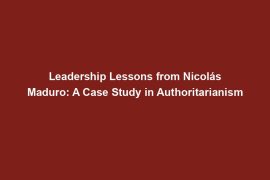Have you ever wondered what makes a great leader? Some leaders have a certain charisma that draws people to them, while others rely on control and authority to maintain power. Hugo Chávez, the former president of Venezuela, was a fascinating example of a leader who used both charisma and control to shape his legacy.
Chávez was known for his charismatic personality, which helped him gain a loyal following and stay in power for over a decade. His ability to inspire and influence others was unparalleled, and his supporters often felt a deep connection with him. Whether it was through fiery speeches or public appearances, Chávez knew how to captivate an audience and rally them to his cause.
However, Chávez’s leadership style was not without its flaws. His authoritarian tendencies often led to backlash and criticism from those who saw his control as problematic. While charisma can be a powerful tool in leadership, relying too heavily on control can have negative consequences. Leaders must find a balance between inspiring others and holding themselves accountable to democratic principles.
In this blog post, we will explore the power of charisma in leadership, as well as the dangers of authoritarian control, using Hugo Chávez as a case study. By examining his legacy, we can glean valuable lessons on how leaders can navigate the complexities of power while maintaining integrity and accountability. So, let’s dive in and uncover the leadership lessons hidden within Chávez’s unique style of governance.
The Power of Charisma in Leadership
Let’s talk about charisma – that intangible quality that some leaders possess in abundance. Hugo Chávez was definitely one of those leaders. His charismatic personality was like a magnet, attracting people to him and helping him gain and retain power in Venezuela for over a decade.
So, what exactly is charisma and how did Chávez use it to his advantage? Charisma is that special something that makes people want to follow you, to believe in your vision, and to trust your leadership. Chávez had it in spades – his passionate speeches, colorful rhetoric, and charismatic presence captivated crowds and inspired loyalty among his supporters.
Imagine being in a room with Chávez, listening to his fiery speeches and feeling the energy and conviction in his words. That’s the power of charisma – it can inspire and influence others in profound ways. Chávez used his charisma to rally his followers, to win over skeptics, and to navigate the treacherous waters of Venezuelan politics.
Whether he was addressing a crowd of cheering supporters or facing off against his political opponents, Chávez’s charisma gave him an undeniable edge. It was his secret weapon, his ace in the hole, that helped him wield power and influence in ways that few leaders can match.
But charisma, like any other tool, has its limitations. In the next section, we’ll explore the dangers of authoritarian control and how Chávez’s reliance on control ultimately led to backlash and criticism. Stay tuned!
The Dangers of Authoritarian Control
While Hugo Chávez’s charismatic leadership style helped him garner a strong following and maintain power, his authoritarian tendencies also played a significant role in shaping his legacy. By wielding control with a heavy hand, Chávez faced backlash from both within Venezuela and internationally.
Chávez’s authoritarian approach led to criticism that he was consolidating power at the expense of democracy. His crackdown on dissent and political opposition only served to exacerbate tensions and deepen divisions within Venezuelan society. This eventually resulted in a series of protests and widespread unrest during his tenure as president.
Analysis of the negative consequences
Authoritarian control can have far-reaching negative consequences for both the leader and the country as a whole. By ruling with an iron fist, leaders like Chávez risk alienating their own citizens, eroding trust in institutions, and stifling dissent. This can ultimately lead to a breakdown in governance, economic instability, and social unrest.
Furthermore, relying solely on control to maintain leadership can create a culture of fear and dependency, rather than one of accountability and transparency. This lack of checks and balances can pave the way for corruption and abuse of power, undermining the very foundations of a democratic society.
Lessons on finding balance
Leaders can learn from Chávez’s mistakes by recognizing the dangers of authoritarianism and striving to strike a balance between charisma and control. Charisma may inspire loyalty and devotion, but it should be tempered with accountability and respect for democratic principles.
By fostering a culture of open dialogue, valuing diversity of opinion, and promoting transparency, leaders can build trust with their constituents and create a more inclusive and resilient society. It’s important to remember that true leadership is not about dominating others, but empowering them to reach their full potential.
Ultimately, the key lesson from Chávez’s legacy is the importance of finding equilibrium between charisma and control. By combining the power of inspiration with the humility of accountability, leaders can avoid the pitfalls of authoritarianism and steer their countries towards a brighter future.


